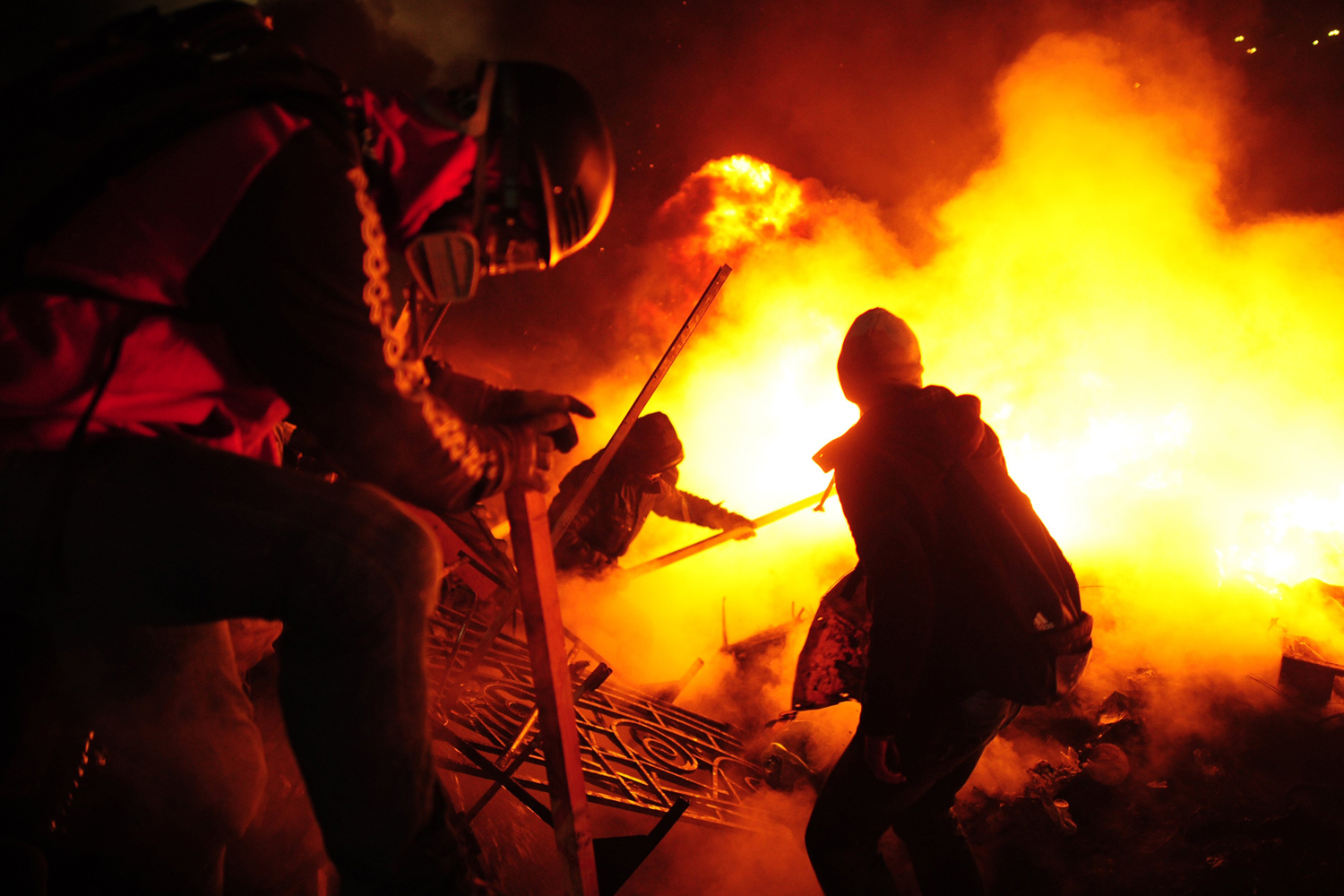
Ukraine is a divided country caught in an increasingly violent tug of war between its past and future.
Begin inside the country. About two thirds of Ukraine’s citizens are ethnic Ukrainians whose first language is Ukrainian. About one-sixth are ethnic Ukrainians who speak Russian. Another one-sixth are ethnic Russians, who live primarily in the east and south near the Russian border. This division creates a fault-line beneath the country that potentially pits one group against the other. Following the Soviet Union’s collapse, Ukrainians of both ethnic groups feared open conflict, and the new country’s stability rested on the promise that no politician could afford to try to win the presidency by playing with these divisions.
(MORE: Ukraine Revolution Erupts in Fresh Violence)
When Vladimir Putin became Russia’s president in 2000, and then a surge in global energy prices helped boost Russia’s economy, Moscow began more actively to try to slow Ukraine’s move toward a future in Europe. Ukrainians eager to break from their past as part of the Russian empire and Soviet Union confronted Russian involvement in Ukrainian politics, culminating in the 2004 Orange Revolution, an uprising in which popular pressure reversed an election result that many ethnic Ukrainians believe was stolen by pro-Russian political figures, led by current President Viktor Yanukovych. Ukrainians celebrated what appeared a decisive break from manipulation by Moscow, and Putin accused the U.S. and Europe of interfering in Ukraine’s domestic politics.
Yet, though the Orange Revolution demonstrated that Ukrainians could reverse a stolen election by taking to the streets, a crucial precedent in a post-Soviet country, the victory did nothing to resolve Ukraine’s larger economic problems, and in 2010, Yanukovych won a legitimate victory as voters rushed toward a candidate who promised a more stable path forward.
(MORE: Ukraine Protesters See Russian Hand in Kiev Crackdown | TIME.com)
Today, the country’s increasingly fragile economy continues to depend on cheap supplies of Russian energy, a dependence Moscow is eager to maintain. For its part, Europe also needs Russian energy supplies, and its political leaders and institutions are far too busy with efforts to stabilize and redesign the Eurozone to want a confrontation with Russia over a country that will not be strong enough to join the European Union for the foreseeable future.
Why the violence now? On November 21, Yanukovych startled his country with a last-minute decision to abandon a crucial trade deal with Europe in favor of closer economic ties with Russia. Angry protesters, already suspicious of Yanukovych’s ties with Putin, flooded the center of Kiev. Within three days, protests swelled to their highest levels since the Orange Revolution ousted Yanukovych in 2004. Police responded aggressively, and the fight was on. Putin moved to stabilize the situation and consolidate his gains with emergency financial help for Yanukovych’s government and the promise of more to come.
Over the past three months, the conflict has ebbed and flowed between negotiations and violence. In recent days, both the demonstrators and Yanukovych have become more aggressive, killing both protesters and police. More nationalist elements have joined the demonstrations, provoking more violence. All sides are digging in, and serious negotiations appear well out of reach.
For lack of better options, the EU has threatened sanctions on Yanukovych’s government, and Obama administration officials are expressing the expected diplomatic concerns. But Americans and Europeans are no more anxious to fight over Ukraine than over Syria — and Putin knows it.
For now, the bloodshed will continue. With Putin’s help, can Yanukovych withstand pressure to surrender? His direct political support depends on powerful Ukrainian businessmen. If these oligarchs renounce their support for him, his resignation might stabilize the situation quickly. In addition, watch the flow of new protesters attempting to enter Kiev from the country’s ethnic Ukrainian-dominated western provinces. But the Russian-dominated eastern territories are most crucial. If ethnic Russians living in Ukraine begin to turn on Yanukovych’s government to end the violence, he’s in imminent danger. That’s a real possibility, because many conflict-weary Ukrainians of both ethnic groups want good relations with both Europe and Russia.
Sadly, Yanukovych’s ouster won’t solve Ukraine’s larger problem: Its Russian-dominated past exerts a powerful pull and Europe is nowhere near ready to help the country build a more peaceful and prosperous future.
Ian Bremmer is president of Eurasia Group and author of Every Nation for Itself: Winners and Losers in a G-Zero World. You can follow him on Twitter @ianbremmer.
More Must-Reads from TIME
- Donald Trump Is TIME's 2024 Person of the Year
- Why We Chose Trump as Person of the Year
- Is Intermittent Fasting Good or Bad for You?
- The 100 Must-Read Books of 2024
- The 20 Best Christmas TV Episodes
- Column: If Optimism Feels Ridiculous Now, Try Hope
- The Future of Climate Action Is Trade Policy
- Merle Bombardieri Is Helping People Make the Baby Decision
Contact us at letters@time.com